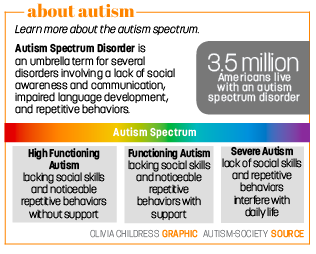For junior Jack Sandifer, performing is more than just singing and dancing on stage; it is his way of expressing himself to and communicating with others. Jack has Asperger Syndrome, a condition on the autism spectrum which affects one’s ability to socialize and communicate.
Jack is a singer for Blue and Gold and he’s also a performer in the Carmel Spectrum Players, a new theater group for young performers who happen to be on the autism spectrum. The group was created two months ago, and will have its inaugural show, the Carmel Spectrum Players Cabaret, on Nov. 1 at the Cat Theatre. Jack will be among the many performers in the Cabaret, but he said this performance is about more than singing; it’s about motivating others to take the opportunity to shine.
“(Since) I have Asperger’s, my mom has learned how while some people may be different, they can still be just as special as anybody else,” Jsck said. “For those who never really had the opportunity to be in performing arts, my mom made the Carmel Spectrum Players to give them more of an opportunity to participate.”

Junior Jack Sandifer prepares to practice the song “She Used to Be Mine” from The Waitress. He said he is passionate about being on stage and finds inspiration from his older sister, who is currently pursuing performing arts at Ball State.
The Carmel Spectrum Players is part of a larger organization called The Jacksonville Foundation, a non-profit organization created to serve the families of those on the autism spectrum through access to theater and performance. Both were started by Jack’s mother, Mari Sandifer, as she believed access to a stage fosters the use of creative expression and enriches the lives of individuals.
“A lot of times, people might not be aware that (students on the spectrum) have these hidden talents, even the child might not know they’re good at something until they’re given the opportunity to do it,” she said. “Anytime someone has a chance to step onstage, it gives them a lot of confidence that they can use going forward in their life.”
Quentin Mullinix, a special education intense communications instructional assistant at CHS, said he also believes performing arts help students on the spectrum. He said these activities are more attuned to the senses, which helps them expand their views.
“They still have experiences and that will impact them in various ways; those that can communicate, they can usually have some level of reflection they can communicate,” Mullinix said. “We could say, ‘Hey did you enjoy that?’ ‘Yes.’… One of the greatest clues that we know that’s true even though they can’t fully articulate it, is the fact that they want to return. ‘You wanna go to choir?’ ‘Yeah!’ If they don’t like it, they’ll tell us typically in one form or another. We know that it’s making some kind of an impact.”
While being able to perform has an impact on the students, Mrs. Sandifer hopes it also changes the way the Carmel community perceives the students and the world that surrounds the autism spectrum.
“I want the show to bring awareness to community that kids are on the spectrum,” she said. “(I want) to make the community aware that it is a large spectrum. These kids are very talented and they have a lot to offer.”
Mrs. Sandifer also believes participating in the Cabaret can encourage participants to develop close relationships with one another.
“I think anytime a group of people get together and put a show on, it bonds them in a certain way because they’re all working toward a goal,” she said. “Hopefully there’ll be some friendships formed and hopefully, there’ll be some opportunity for these kids to see that they do have a talent that can be shared and give them some self-confidence.”
Mullinix said there are many benefits for people not on the spectrum to work and interact with these students as well.
“(Working with students on the spectrum) teaches us patience,” he said. “It helps us understand that people are so much more capable of things than we realize… It gives us an appreciation for the human condition regardless of what disabilities they have.”
Jack said support from others has helped him develop a voice and work to his potential.

“My older sister is a singer and a performer and she inspired me to join musicals, participate in choir and to do all sorts of fun activities,” Jack said. “It’s helped me learn how I can be more expressive and it’s also helped improve my ability to sing.”
Likewise, the benefits of the interaction between students on the spectrum and performing arts is far-reaching. Both Jack and Mullinix agree that it develops important qualities for both students on the spectrum and those who work with them.
“Anybody who’s interested in pursuing (working with kids on the spectrum), I think it’s a worthy thing to pursue because you can really gain a lot out of developing these friendships,” Mullinix said. “Again, it’s a great teacher for us to learn to be patient because every one of us, if we decide to get married and have children someday, we have to learn to be patient with our children just as much as with special ed students, so this in one sense is really good training… I think it’s a really good challenge. It helps stretch us as human beings.”

































![AI in films like "The Brutalist" is convenient, but shouldn’t take priority [opinion]](https://hilite.org/wp-content/uploads/2025/02/catherine-cover-1200x471.jpg)









































![Review: “The Immortal Soul Salvage Yard:” A criminally underrated poetry collection [MUSE]](https://hilite.org/wp-content/uploads/2025/03/71cju6TvqmL._AC_UF10001000_QL80_.jpg)
![Review: "Dog Man" is Unapologetically Chaotic [MUSE]](https://hilite.org/wp-content/uploads/2025/03/dogman-1200x700.jpg)
![Review: "Ne Zha 2": The WeChat family reunion I didn’t know I needed [MUSE]](https://hilite.org/wp-content/uploads/2025/03/unnamed-4.png)
![Review in Print: Maripaz Villar brings a delightfully unique style to the world of WEBTOON [MUSE]](https://hilite.org/wp-content/uploads/2023/12/maripazcover-1200x960.jpg)
![Review: “The Sword of Kaigen” is a masterpiece [MUSE]](https://hilite.org/wp-content/uploads/2023/11/Screenshot-2023-11-26-201051.png)
![Review: Gateron Oil Kings, great linear switches, okay price [MUSE]](https://hilite.org/wp-content/uploads/2023/11/Screenshot-2023-11-26-200553.png)
![Review: “A Haunting in Venice” is a significant improvement from other Agatha Christie adaptations [MUSE]](https://hilite.org/wp-content/uploads/2023/11/e7ee2938a6d422669771bce6d8088521.jpg)
![Review: A Thanksgiving story from elementary school, still just as interesting [MUSE]](https://hilite.org/wp-content/uploads/2023/11/Screenshot-2023-11-26-195514-987x1200.png)
![Review: "When I Fly Towards You", cute, uplifting youth drama [MUSE]](https://hilite.org/wp-content/uploads/2023/09/When-I-Fly-Towards-You-Chinese-drama.png)
![Postcards from Muse: Hawaii Travel Diary [MUSE]](https://hilite.org/wp-content/uploads/2023/09/My-project-1-1200x1200.jpg)
![Review: "Ladybug & Cat Noir: The Movie," departure from original show [MUSE]](https://hilite.org/wp-content/uploads/2023/09/Ladybug__Cat_Noir_-_The_Movie_poster.jpg)
![Review in Print: "Hidden Love" is the cute, uplifting drama everyone needs [MUSE]](https://hilite.org/wp-content/uploads/2023/09/hiddenlovecover-e1693597208225-1030x1200.png)
![Review in Print: "Heartstopper" is the heartwarming queer romance we all need [MUSE]](https://hilite.org/wp-content/uploads/2023/08/museheartstoppercover-1200x654.png)




